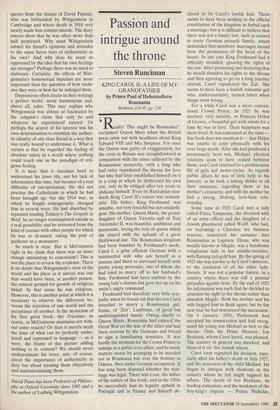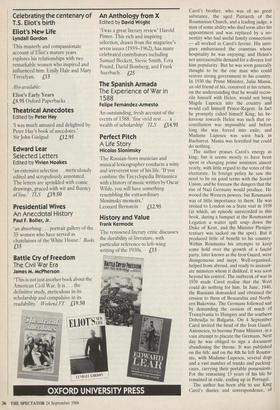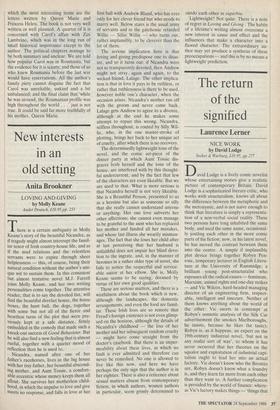Passion and intrigue around the throne
Steven Runciman
KING CAROL II: A LIFE OF MY GRANDFATHER by Prince Paul of Hohenzollern- Roumania Methuen, £14.95, pp. 238 Really! This might be Roumania!', exclaimed Queen Mary when the British press came out with headlines about King Edward VIII and Mrs Simpson. For once the Queen was guilty of exaggeration; for the crisis in Britain was straightforward in comparison with the crises suffered by the Roumanian monarchy, with a king who had twice repudiated the throne for love but who had later established himself on it in a coup in which he dethroned his own son, only to be obliged after ten years to abdicate himself. Even by Ruritanian stan- dards King Carol II's career was remark- able. His father, King Ferdinand, was amiable, not very forceful but not unintelli- gent. His mother, Queen Marie, the grand- daughter of Queen Victoria and of Tsar Alexander II, was beautiful, ambitious and passionate, loving the role of queen which she played with the aplomb of a great Hollywood star. The Roumanian kingdom had been founded by Ferdinand's uncle, Carol I, a grim efficient German with a sentimental wife who saw herself as a poetess and liked to surround herself with pretty young poetesses, one of whom she had tried to marry off to her husband's heir. Ferdinand had been smitten by the young lady's charms but gave her up on his uncle's angry command.
Ferdinand had therefore very little sym- pathy when he found out that his son Carol intended - to marry a Roumanian girl, loana, of `Zizi', Lambrino, of good but undistinguished family. Owing chiefly to Queen Marie, Roumania had entered the Great War on the side of the allies and had been overrun by the Germans and forced to sign a humiliating armistice. It was hardly the moment for the Crown Prince to indulge in a public love-affair; and he made matters worse by arranging to be married not in Roumania but over the frontier in Odessa, then under German occupation. It has long been disputed whether the mar- riage was legal. There was a son, the father of the author of this book; and in the 1950s he successfully had its legality upheld in Portugal and in France and himself de- dared to be Carol's lawful heir. There seems to have been nothing in the official constitution of the kingdom to forbid such a marriage; but it is difficult to believe that there was not a family law, such as existed in every German princely family, which demanded that members' marriages should have the permission of the head of the house. In any case King Ferdinand had it officially annulled, ignoring the rights of the son. After protesting and declaring that he would abandon his rights to the throne and then agreeing to go on a long journey abroad, Carol repudiated his Zizi. She seems to have been a foolish romantic girl who, understandably, turned bitter when things went wrong.
For a while Carol was a more conven- tional Crown Prince. In 1921 he was married, very suitably, to Princess Helen of Greece, a beautiful girl with whom for a time he was in love. Their happiness was short-lived. It was rumoured at the time this book does not mention it — that Helen was unable to cope physically with his over-large needs. After she had produced a prematurely born son, Michael, physical relations seem to have ceased between them; and Carol returned to a promiscuous life of girls and motor-cycles. As regards public affairs he was of little help to his parents, as he took a lasting dislike to all their ministers, regarding them as his mother's creatures; and with his mother he had a strong, lifelong, love-hate rela- tionship.
Some time in 1923 Carol met a lady called Elena Tampeanu, the divorced wife of an army officer and the daughter of a Jewish pharmacist called Wolff, who had, on becoming a Christian for business reasons, translated his surname into Roumanian as Lupescu. Elena, who was usually known as Magda, was a handsome voluptuous lady in her middle-twenties, with flaming red-gold hair. By the spring of 1925 she was known to be Carol's mistress, to the exclusion of all his other lady- friends. It was not a popular liaison, in a country where there was still a general prejudice against Jews. By the end of 1925 his infatuation was such that he decided to abandon his right to the throne rather than abandon Magda. Both his mother and his wife begged him to think again; but by the new year he had renounced the succession. On 4 January, 1926, Parliament had accepted his renunciation and had recog- nised his young son Michael as heir to the throne. Only the Prime Minister, Ion Bratianu, whom Carol hated, was pleased. The country in general was shocked, and blamed it on 'the Jewish whore.'
Carol soon regretted his decision, espe- cially after his father's death in July 1927, and the accession of the child Michael. He began to intrigue with elements in the country whom he felt might support his return. The death of Ion Bratianu, its leading statesman, and the weakness of the boy-king's regents — Prince Nicholas, Carol's brother, who was of no great substance, the aged Patriarch of the Roumanian Church, and a leading judge, a man of some ability who died soon after his appointment and was replaced by a no- nentity who had useful family connections — all worked in Carol's favour. His intri- gues embarrassed the countries whose hospitality he was enjoying; and Helen's not unreasonable demand for a divorce lost him popularity. But he was soon generally thought to be the one man who could restore strong government to his country. In 1930 the Prime Minister, Juliu Maniu, an old friend of his, connived at his return, on the understanding that he would recon- cile himself with Helen, would not bring Magda Lupescu into the country and would call himself Prince-Regent. In fact he promptly called himself King; his be- haviour towards Helen was such that re- conciliation was impossible and before long she was forced into exile; and Madame Lupescu was soon back in Bucharest. Maniu was horrified but could do nothing.
The author praises Carol's energy as king; but it seems mostly to have been spent in changing prime ministers almost yearly, with little regard to the votes of the electorate. In foreign policy he saw the need to be on good terms with the Soviet Union, and he foresaw the dangers that the rise of Nazi Germany would produce. He wooed the Western powers; but Roumania was of little importance to them. He was invited to London on a State visit in 1938 (at which, an episode unrecorded in this book, during a banquet at the Roumanian Legation a waiter spilt soup down the Duke of Kent, and the Minister Plenipo- tentiary was sacked on the spot). But it produced little of benefit to his country. Within Roumania his attempts to keep some hold over the growth of a fascist party, later known as the Iron Guard, were disingenuous and inept. Well-organised, helped from abroad, and ready to assassin- ate ministers whom it disliked, it was soon beyond his control. The outbreak of war in 1939 made Carol realise that the West could do nothing for him. In June, 1940, the Russians demanded and obtained the cession to them of Bessarabia and North- ern Bukovina. The Germans followed suit by demanding the cession of much of Transylvania to Hungary and the southern Dobrudja to Bulgaria. On 4 September Carol invited the head of the Iron Guard, Antonescu, to become Prime Minister, in a vain attempt to placate the Germans. Next day he was obliged to sign a document abandoning the throne. It was published on the 6th; and on the 8th he left Rouma- nia, with Madame .Lupescu, several dogs and a vast number of trunks and packing- cases, carrying their portable possessions. For the remaining 13 years of his life he remained in exile, ending up in Portugal.
The author has been able to use King Carol's diaries and correspondence, of which the most interesting items are the letters written by Queen Marie and Princess Helen. The book is not very well written or well planned. A quarter of it is concerned with Carol's affair with Zizi Lambrino, which was in the long run of small historical importance except to the author. The political chapters manage to be both summary and unclear. We are told how popular Carol was in Roumania, but the evidence for it is scanty; and those of us who knew Roumania before the last war would have reservations. All the author's family piety cannot disguise the fact that Carol was unreliable, unkind and a bit unbalanced; and the final claim that 'while he was around, the Roumanian profile was high throughout the world . . .' just is not true. It could be said far more truthfully of his mother, Queen Marie.
































































 Previous page
Previous page